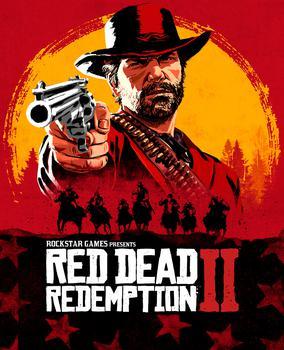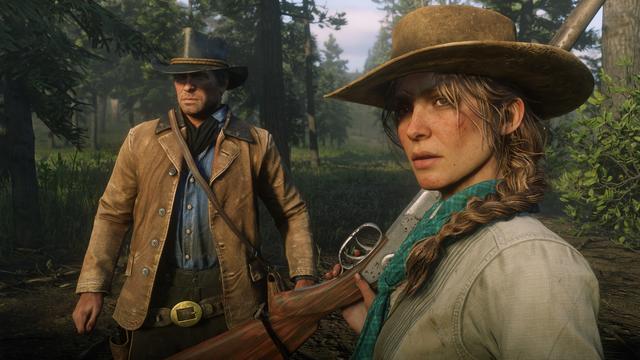
Red Dead Redemption 2: What’s your favorite game worth to you?
Within a week’s time, my household is going to be without a TV. The roommate who owns the thing is moving out, so we will have to watch our Netflix specials on a laptop for a while. This would not normally be a big deal, were it not for the fact that we are only two weeks before the release of a much-anticipated game: Red Dead Redemption 2.
Red Dead Redemption 2
Red Dead Redemption 2 is a Western-themed game, a prequel to the previous Red Dead Redemption (2010). The game follows outlaw Arthur Morgan as he struggles with his moral compass in an America that is closing the doors on its Wild West era. These games are developed by Rockstar Games, the company that also gave us the notorious Grand Theft Auto series. They are known and beloved for their beautifully created interactive open worlds, which always respond naturally wherever a player goes, whatever a player does.

One Vulture journalist who was allowed to play a few hours of the game pre-release writes: “Game critics always call this “being immersed,” but “immersed” almost doesn’t do it justice. This world of Red Dead Redemption 2 feels so alive and real, you feel projected into it and then possessed by it.” To achieve this level of game play, the writers reportedly created a stack of scripts the height of 2,5 meters, including 80 pages for every non-playable character.
However, not all coverage on the game has been as positive. In that same Vulture article, the company’s president Sam Houser tells: “We’ve poured everything we have into [Red Dead Redemption 2]. We have really pushed ourselves as hard as we can.” While lead writer Dan Houser reveals that the team has been working “100 -hour weeks.” Consequently, the release of Red Dead Redemption 2 has inspired a new conversation about the toxic way in which the gaming industry treats its labor force.
Labouring in the gaming industry
Over the years, the gaming industry has become notorious for making its workers push themselves to and beyond the limit. In a Game Informer article by David Milner earlier this year employees from the gaming industry talk about their experiences while working in ‘crunch mode’, when the enthusiasm for the project and the loyalty to the team make them work beyond the point of physical and mental exhaustion while absorbing all semblance of a personal life as “life became work and work became life”.
The impact of this work ethic in the personal realm was an explicit point of discussion after the supposed spouses of Rockstar Games employees wrote an open letter at the time of the original Read Dead Redemption, revealing the toll the industry is taking on the families of their workers.
It has long become clear that these are not isolated incidents. Milner points out the statistics to paint a picture of a developer’s lived reality: “A 2015 survey conducted by the International Game Developers' Association (IGDA) found that 62 percent of developers said their jobs involved crunch. Of those, nearly one-third said crunch meant 50-59 hours of work a week; another third said 60-69 hours; and just under a quarter admitted to crunching more than 70 hours a week – the highest bracket accounted for.” What is more, these extra hours of work are reportedly unpaid as they are understood to be part of a developer’s work ethic.
Players do not necessarily care about the exploitation of the creators of their favorite games
To make matters worse, these practices have been shown to lead to even larger problems in the industry, as the only way a company can justify the insane amount of hours of work by their employees when the project does in fact become a hit. However, when the game does not make a splash, the industry is quick to annihilate both the game and the people who developed the game – including the crunch-working employees that might have compromised their mental and social health in the process.
In a The Verge article, Megan Farokhmanesh paints the picture of a 36 billion dollar industry that seems to make sure that one group always takes the hit: the developers. “Layoffs are a pervasive fact of life, even at successful studios where developers are often hired en masse to help hit tight deadlines and then fired to cut costs after the game ships or is canceled. With the next deadline, the cycle begins anew. Overwork, job insecurity, and profound burnout are omnipresent concerns; more than three-quarters of developers report working under “crunch” conditions, which can mean working up to 20 hours a day and more than 100 hours a week.”
The players in the gaming industry
In the meantime, the gaming industry does not seem to be paying a lot of attention to its developers, but rather focusses its attention on those that are considered the main ‘owners’ of the industry: the players. In turn, these players do not necessarily seem to care about the exploitation of the creators of their favorite games, while conversation continues to revolve around the quality of the games rather than the developers behind them. It seems unlikely that the gaming community will have any reverence for the “100-hour weeks” the developers made while working on Red Dead Redemption 2, if it does not live up to its reputation.
As depressing as the current state of affair is, I can see the shimmering of a silver lining in this particular situation: I will not be faced with the moral dilemma of whether or not I will be supporting Red Dead Redemption 2 – my roommate took that problem away from me when she took our TV.
